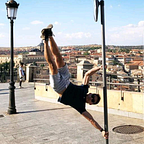Climbing to the highest peak
🧗♀️ Hill Climbing
I came across this classic algorithmic problem in computer science called hill climbing in ‘Algorithms to Live By: The Computer Science of Human Decisions’.
A few algorithms aim to optimize this problem — that I believe, are analogous to how we approach our careers. I’ll explain:
The simplest approach is to keep walking upwards. Just take the path that slopes upwards the most and keep going up. This is the best immediate choice, and in computer science, is referred to as the greedy algorithm.
The risk of this method is that you could very well end up at the peak of the smallest hill. You’re effectively covering a tiny part of the terrain.
A more advanced approach is to introduce some randomness into your hike. Perhaps halfway through your climb, you choose a slightly different route. Over time, as you familiarize yourself with the terrain, you dial down the level of randomness.
Lastly, to introduce even more sophistication: you randomly select a new starting point each time to do a bit of climbing (random-restart hill climbing). As you climb, you occasionally move to a lower point to explore other paths, reducing your probability of taking the wrong path (simulated annealing). You do this to cover as much square footage as possible.
In this case, the more complex algorithms mentioned are more likely to get you to that highest peak, as you probably figured out.
👔 Climbing Your Career
How does computer science and hiking relate to career progression?
The first case represents tunnel vision.
Perhaps someone has been in the same situation for a while, constantly chasing the next level up.
The scope of the role has maintained consistent, with incremental growth opportunities. Optimizing to the next immediate level is the constant focus.
But, in most cases, corporations no longer reward loyalty as much as they used to, and the growth / reward over time curve exponentially decreases.
I’ll call out some caveats though: hyper-growth startups are one. Spending a decade at a traditional institution is different from ten years at a company that has accelerated from seed stage to IPO.
Remember the metaphorical fog I spoke about earlier? A second caveat is that some folks don’t have fog. It’s rare, but I’ve met individuals who’ve been passionate, and as a result, laser-focused, on a profession since a young age.
The second case introduces some randomness.
This includes ‘stretch’ and growth projects, networking events, exploratory interviews with other companies, extracurricular activities, taking on work that is out-of-scope, and so forth. Dipping your toes in the water.
When randomness is introduced, opportunities for growth emerge.
As you experiment more and venture outside your comfort zone, you establish breadth of knowledge and experience.
Eventually, you focus more and experiment less, which is how you establish domain knowledge and subject matter expertise.
The last scenario continues to build on the initial randomness and experimentation — with more energy, time, and capital investment.
It could look like committing to a lateral career move, starting a new venture, angel investing, quitting your job to pursue a high-growth opportunity, conducting learning sprints, or intentional world travel.
It may temporarily involve a step-back in your career trajectory, but will be rewarding in the long run.
- You’ll generally be more fulfilled due to the breadth of things you experience.
- Your ability to learn (meta-learning) is improved. You’re able to dot-connect more effectively.
- You’ll adopt a growth mindset vs a fixed one. Starting from a blank slate requires humility and self-awareness.
Frankly, I’m still early in my career, climbing the metaphorical hill. But I’ve been fortunate enough to receive advice from mentors, advisors, and counsel of whom have done incredible things — and whom I deeply trust, and their advice has been this:
Experiment, try new things.
Or in the words of a good friend and mentor, Jason:
Try shit, repeatedly.
✅ How do you apply this?
Here’s how to introduce experimentation, randomness, and learning to your routine:
- Expand your circle of competence by broadening the breadth of people you talk to. Talk to advisors, mentors, peers, and mentees. Get their perspective and learn about what they do. Put yourself in their shoes.
- Observe and learn by reading, listening, and watching. Dig yourself into different rabbit-holes on topics you normally wouldn’t think about. Spend an hour a day for two months reading about ants. Listen to a daily podcast about eCommerce companies in Brazil. Watch ten hours of TED talks on architecture and interior design, if you find it interesting.
- Volunteer by giving time to Not-for-Profit communities or advising companies. It’s an easy, low-barrier approach to learning about a new space.
- Immerse yourself in a completely new space. Join a new platform (e.g. Twitter), attend weekly Blockchain meetups, and only hang out with HealthTech founders for a month. See how your perspective widens.
- Build things. Establish a community, No-Code an app, write a newsletter, or start a foundation. Create something out of nothing, and learn the 0 → 1.
Additionally — every week, ask yourself: how did I challenge myself?
- What experiments do I want to run?
It could be intellectually, spiritually, socially, physically… you get the point
